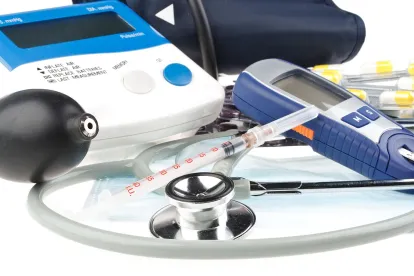Physician-owned companies that generate revenue from the sale of medical devices ordered by their physician owners have in recent years been the target of federal fraud and abuse enforcement actions. OIG Advisory Opinion 22-07 addresses an arrangement in which physician ownership in a medical device company would not prompt the HHS Office of Inspector General to impose sanctions under the Anti-Kickback Statute.
Sometimes referred to as physician-owned distributorships, or “PODs,” physician-owned medical device companies may design, manufacture, and/or distribute implantable devices used in neurosurgery, orthopedic surgery, and other surgical procedures. Controversy has arisen from the potential for these companies to profit from the sale of products that their physician owners may order for use in procedures performed on their own patients.
Many physicians and industry groups maintain that PODs promote innovation and higher-quality care by allowing physicians to leverage their expertise and entrepreneurialism to develop and improve medical device technology. Regulators and critics, however, contend that PODs are all too often characterized by financial incentives that constitute unlawful business arrangements and may encourage unnecessary—and even potentially harmful—medical procedures. In a 2013 Special Fraud Alert on Physician-Owned Entities, the Office of Inspector General (OIG) of the US Department of Health and Human Services (HHS) outlined what it considered to be “questionable features” of a POD, observing that PODs are “inherently suspect” under the Anti-Kickback Statute (AKS).
Against this backdrop, OIG’s April 25, 2022, Advisory Opinion analyzed an arrangement whereby certain physicians held ownership in a company manufacturing products that those physician owners may order for use in their surgical procedures. Notably, the Opinion highlights an example of a physician-owned entity that OIG elected not to challenge. At the same time, the Opinion serves as a reminder that the 2013 Special Fraud Alert remains the definitive guidance for OIG’s review of POD arrangements.
The Arrangement
The Opinion involved three orthopedic surgeons—a father, his daughter, and the daughter’s husband, all of whom were members of the same medical group—and a medical device company the father formed to develop his upper extremity surgical technology inventions into commercial medical devices. The father acquired a majority ownership interest and preferential voting rights in the company through a transaction in which he assigned his ownership of a substantial portfolio of proprietary technology to the company for use in developing its product lines. Later, the father contributed his company ownership to two irrevocable family trusts, the beneficiaries of whom included the daughter. The minority owners were company managers and employees, none of whom was a healthcare practitioner or an immediate family member of a healthcare practitioner who ordered company products.
All three of the physicians ordered the company’s products for use in surgeries they performed at affiliated hospitals or ambulatory surgical centers (ASCs). However, their orders comprised a small percentage of the company’s total sales. In 2019, 2020, and 2021, total product orders by the three physicians and other members of their group practice constituted 0.98%, 0.36%, and 0.45%, respectively, of all US gross revenues.
Moreover, the product orders that originated from the three physicians did not inure to their financial benefit. The only profit distributions the company issued were in the form of annual distributions to cover each owner’s associated income tax obligations. The company certified that any future distributions to the physicians (via the family trusts) would be reduced by the amount of revenue attributed to product orders by any of the three physicians or other members of their medical group.
OIG’s Analysis
OIG determined that the arrangement implicated the AKS because: (1) the physicians ordered company products or recommended those products to others; (2) the products were reimbursable by federal healthcare programs; and (3) the physicians held a financial interest in the company as beneficiaries of the trusts (or, in the case of the husband, as the spouse of a trust beneficiary). OIG further determined that these financial interests were not protected under the AKS safe harbor for investment interests in small entities because the physicians’ collective ownership exceeded a safe harbor requirement that no more than 40% of the value of the investment interests be held by investors who are potential referral sources.
Citing its 2013 Special Fraud Alert, OIG noted its “longstanding concerns regarding physician-owned entities that derive revenue from selling, or arranging for the sale of, implantable medical devices ordered by their physician owners for use in procedures the physician owners perform at hospitals or ASCs.” Ultimately, however, the agency concluded that the arrangement did “not raise the concerns identified in the 2013 Special Fraud Alert” and included “certain other safeguards” that minimized the risk of fraud and abuse:
-
Legitimate Business Operations and Structure: The medical device company was not merely a “shell entity.” It maintained robust operations indicative of a legitimate business enterprise, including dozens of employees and extensive product review processes. Further, the physicians’ ownership of the company can be traced back to the father’s original inventions, which were the underlying source on which all of the company’s products were developed.
-
Profit Distributions: The carveout of future profits paid to the physician owners (through the trusts) for products they or others from their medical group ordered would “meaningfully dilute” the financial incentives the physician owners may have to order the products. The company also assured that if future distributions were made for amounts other than the owners’ tax liabilities, the distributions would be made to all owners—not just the physician owners—and in direct proportion to each owner’s percentage of ownership.
-
Non-Owner Product Users: In contrast to questionable PODs “where physician owners are the sole, or primary, users of (and sources of business for) the devices sold or manufactured by their physician-owned entities,” the company derived less than 1% of all of its domestic gross revenue during the prior three years from products ordered by the physician owners and group members. Moreover, this portion of company revenues had been on an overall downward trajectory, which was expected to continue as more non-owner physicians ordered the company’s products.
-
Terms and Conditions on Physician Ownership Interests: Some PODs “select or retain physician investors in suspect ways, such as by retaining the right to repurchase physicians’ ownership interests or requiring physician owners to divest their interests if the physicians cease practicing medicine or refer less business to the physician-owned entity.” But here, no such terms and conditions were imposed on the physicians’ ownership interests.
-
No Influencing or Meddling in Purchasing Decisions: Although the physicians may recommend and order company products for surgeries they personally perform at hospitals and ASCs, the physicians did not attempt to influence or coerce any facility to purchase the company’s products.
-
Transparency: The physicians provided their patients with written notice of each physician’s ownership interest in the company or relationship with an immediate family member holding an ownership interest. The notice also identified alternative medical device companies in which neither the physicians nor any of their family members held an ownership interest, and patients were free to request that their physicians use devices from these companies. Additionally, the physicians informed all hospitals and ASCs where they practiced of their ownership interest in the company or relationship with an immediate family member with an ownership interest, and the physicians also disclosed the same in any academic presentations, lectures, or peer-reviewed publications regarding the company’s products.
Key Takeaways
Advisory Opinion 22-07 is helpful in illustrating how a physician-owned medical device company should be structured and operated for purposes of AKS compliance. Medical device companies and their physician owners are advised to consider whether their companies’ ownership structures and operations align in some form with OIG’s analysis. Likewise, hospitals and ASCs purchasing products from PODs should consider the similarity with which those PODs are structured in regards to OIG’s analysis.
By the same token, Advisory Opinion 22-07 reaffirms the 2013 Special Fraud Alert and OIG’s position that PODs are “inherently suspect.” Stakeholders should continue to refer to that guidance to ensure any arrangement involving a POD complies with the AKS, recognizing the increased scrutiny that PODs continue to receive.
The Advisory Opinion is available here.




 />i
/>i
